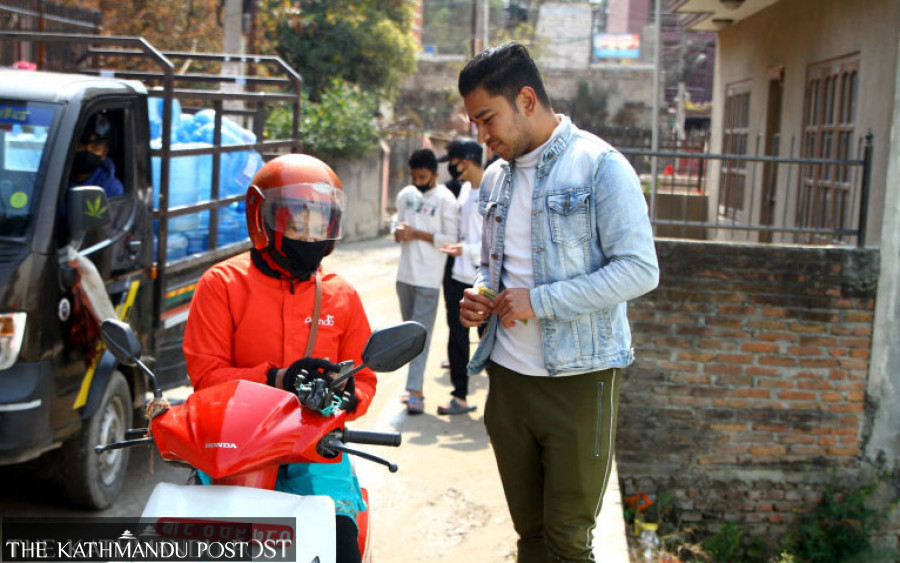Money
Ride-hailing startups on expansion spree. But lack of rules hinders competition
Pathao expanded services to 18 cities starting April 13, after six years since it began services in Kathmandu.
Krishana Prasain
While Pathao, an app-based ride-hailing and food delivery company, has been expanding aggressively, other such companies remain stuck as they wait for guidelines to expand in and out of Kathmandu Valley.
Pathao has started its service in 18 cities across the country starting from the Nepali New Year on April 13, after six years of service in Kathmandu Valley. It launched its service in Chitwan in September 2022.
The company said demand for a convenient and cost-effective transportation service outside the Kathmandu Valley has been increasing lately.
“We have now reached all seven provinces,” said Suraksha Hamal, head of marketing of Pathao Nepal. “Within a week of announcing our expansion, we have received applications from 5,000 riders. There are more than 1,000 rides daily outside Kathmandu and Chitwan. Both riders and customers are growing,” she said.
Customers in the newly expanded markets can bid on the approximate fare displayed on the app when using the ride service, Hamal said.
Pathao was founded in 2015 in the US and officially started on September 24, 2018, in Kathmandu.
Pathao ride-hailing service has been expanded to nine cities of Koshi province including Biratnagar, Damak, Urlabari, Biratchowk, Itahari, Inaruwa, Dharan, Birtamod and Bhadrapur. In Madhesh province ride-hailing service of Pathao is available in Birgunj and Janakpur.
Similarly, Pathao ride-hailing service has started in Pokhara of Gandaki province; Butwal, Nepalgunj and Bhairahawa of Lumbini province, and Birendranagar of Sudurpaschim province.
The company plans to further expand its service in other cities of the country shortly.
Tootle, a once popular ride-hailing platform, resumed its services on September 1 last year, but it is now focussed on goods deliveries. Officials at the company said they have no immediate plans to expand service outside the Kathmandu Valley.
Tootle, the Nepali tech startup, began operations in January 2017.
Initially, a team comprising Aayush Subedi, Princi Koirala, Bina Laxmi Shrestha, Sixit Bhatta and a few others had designed an app to track Sajha buses. It soon became popular. However, due to the lack of marketing and transparency, its public faith started to erode. Then Pathao emerged as the dominant player in the market.
Zapp Services Pvt Ltd currently operates Tootle. The company refused to comment on its plan.
When Pathao enjoyed a market monopoly after the fall of Tootle, the United States-based inDrive launched its service in Nepal in April 2022.
Currently, inDrive’s ride-hailing service is available in Kathmandu, Pokhara and Chitwan.
The company said it too has no immediate plans to expand to other cities. According to industry insiders, inDrive is waiting for government guidelines to ensure its legality.
“We don’t have an immediate market expansion plan in Nepal. We want to focus on the cities we are currently present in. We want to grow our business there,” Pavit Nanda Anand, the Asia Pacific region communication lead of inDrive, told the Post via WhatsApp.
“Nepal is an exciting market and we entered the market to support local communication and connect drivers and passengers for affordable and convenient mobility solutions.”
The company declined to disclose the number of riders and rides in Nepal.
inDrive became popular in a short time among Nepalis as it launched the apps where service seekers were able to negotiate on the fare rates.
For Pathao, currently Pokhara and Butwal are the top-performing markets. “Growth is picking up gradually in other cities as well,” Hamal said.
Pathao plans to launch its service in auto-rickshaws, the popular mode of transport in most of the Tarai region. “We have expanded the service to allow service seekers to book rides from one city to another.” Pathao takes a commission of 20 percent from each bike ride.
According to Pathao, there are more than 200,000 people involved with the platform, including more than 90,000 bike riders, 10,000 taxi drivers and 5,000 food delivery boys.
The two other companies—Tootle and InDrive—did not disclose their figures.
In February this year, the government classified ride-hailing services as a service-oriented industry under the Industrial Enterprises Act 2020. This gives ride-hailing companies legal status, seven years after they started operations in Nepal.
But the government has been dilly-dallying the provision to bring the guidelines which manage the ride-hailing companies by regulating the fares.
The draft guidelines for ride-hailing propose registering cars and motorbikes used for ride-hailing, similar to traditional taxis, operating them under the regulations of the Ministry of Transport.
Under the guidelines the companies would have to renew their operations annually at the transport management offices.
The guidelines will also regulate the fare and have made passenger insurance mandatory.
The Motor Vehicles and Transport Management Act 1993 has mentioned that vehicles registered for private use should not be used for public transportation.
Bagmati province officially legalised ride-hailing services in June 2022, but did not issue any guidelines or policy.
According to the 60th annual report of the Auditor General, there are 25 ride-hailing companies in Nepal using the global positioning system (GPS) and digital platforms, but none of them are registered for their current operations.




 14.12°C Kathmandu
14.12°C Kathmandu













